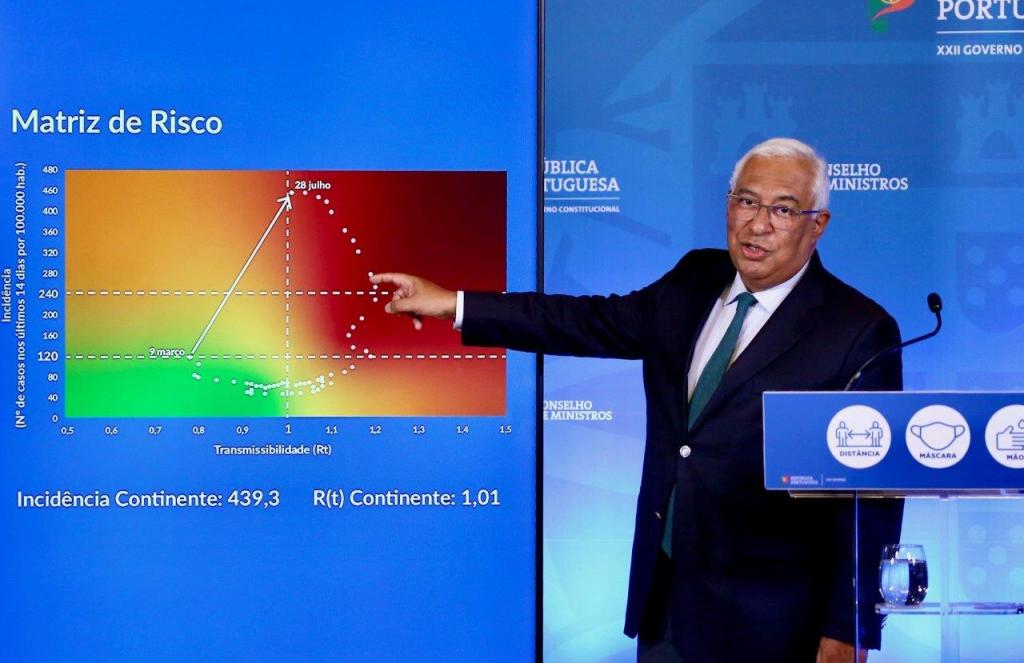Thessaloniki gets ready for its metro launch in November
The underground rapid transit lines have been under construction for almost two decades due to various project delays
 TheMayor.EU logo
TheMayor.EU logo 
PM António Costa speaking at the press conference on Thursday, 29 July, Source: Government of Portugal
PM António Costa unveiled a 3-step plan of easing restrictions
Portuguese people had to face the unpleasant reality of enduring anti-pandemic curfews right as the summer season was stepping up the gears. However, the summer wave now seems to be curbed as the vaccination rate is proceeding smoothly, which gave reasons for the Government to be cautiously optimistic.
Prime Minister António Costa gave a press conference on 29 July in Lisbon where he presented the latest plan for easing up the restrictions. It consists of three phases and is meant to go along and correspond to the vaccination rates in the country, which the Government said were unfolding better than the EU average.
The 3-step plan is scheduled to kick in on Sunday, 1 August when there will be a removal of limitations on street circulation. Sporting events will be open to the public (with social distance rules), cultural shows will operate at 66% capacity, but for weddings and baptisms, this will be only 50%. Remote working will change from mandatory to recommended. Bars and clubs will remain closed and parties and popular pilgrimages, which generate large crowds, will not be allowed.
The second phase, slated for the beginning of September (and depending on having reached 70% of a vaccinated populace), will see the end of the mandatory use of masks on public spaces, except in large gatherings, the increase in the capacity of weddings and baptisms and shows to 75%, and the end of capacity limits on public transport and the need to pre-book public services.
The third phase, planned for October (and depending on having reached 85% of vaccinated people), will see the opening of bars and clubs, with entry with a digital certificate or negative test, the ends of the limitation of the number of people per group in restaurants and the limited capacity in all venues.
The "intensive use of the digital certificate or, in its replacement, negative tests" will stay, and will be a condition for air or sea travel, access to tourist establishments or accommodation, restaurants, group classes in gyms, spas, casinos, and cultural, sporting or business events with more than a thousand people in an open environment, or 500 people in an indoor environment. The same goes for weddings, baptisms and other festivities with more than 10 people.
If you want to keep up with how European cities and regions are changing, follow us on Facebook, Twitter and Instagram.

The underground rapid transit lines have been under construction for almost two decades due to various project delays

Now you can get your wine in Talence by paying directly in Bitcoin

That’s because the state has to spend money on updating the railway infrastructure rather than subsidizing the cost of the popular pass

Rethinking renewable energy sources for the urban landscape

The examples, compiled by Beyond Fossil Fuels, can inform and inspire communities and entrepreneurs that still feel trepidation at the prospect of energy transition

Now you can get your wine in Talence by paying directly in Bitcoin

The 10th European Conference on Sustainable Cities and Towns (ESCT) sets the stage for stronger cooperation between the EU, national and local level to fast track Europe's transition to climate neutrality.

At least, that’s the promise made by the mayor of Paris, Anne Hidalgo

The underground rapid transit lines have been under construction for almost two decades due to various project delays

At least, that’s the promise made by the mayor of Paris, Anne Hidalgo

Hostal de Pinós is located in the geographical centre of the autonomous region

Despite its church-y name, the district has long been known as the hangout spot for the artsy crowds

Urban dwellers across the EU are having a say in making their surroundings friendlier to people and the environment.

Forests in the EU can help green the European construction industry and bolster a continent-wide push for architectural improvements.

Apply by 10 November and do your part for the transformation of European public spaces

An interview with the Mayor of a Polish city that seeks to reinvent itself

An interview with the newly elected ICLEI President and Mayor of Malmö

A conversation with the Mayor of Lisbon about the spirit and dimensions of innovation present in the Portuguese capital














